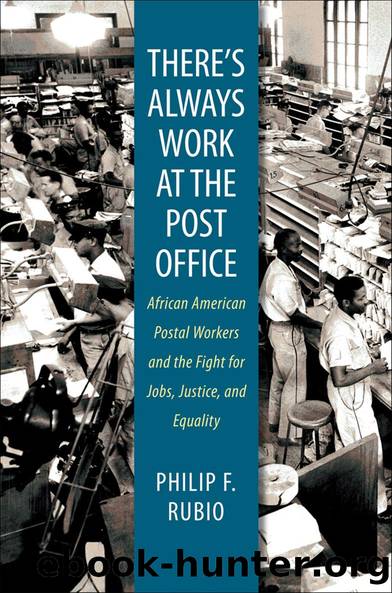There's Always Work at the Post Office by Philip F. Rubio

Author:Philip F. Rubio [Rubio, Philip F.]
Language: eng
Format: epub
ISBN: 9780807859865
Barnesnoble:
Publisher: The University of North Carolina Press
Published: 2010-05-15T00:00:00+00:00
Joseph Henry presides over a branch meeting in 2005. An NALC Branch 142 member since 1962, after the two segregated Washington, D.C., branches integrated, Henry was president from 1998 to 2008. He was also a supporter of the 1970 postal strike, but a questionable local vote count kept him and other strike supporters from walking out in D.C. Courtesy of Joseph Henry.
Times-Dispatch on March 24, after his union voted unanimously to strike in that city on March 28: âWe will have pickets at the main post office at 12:01 A.M., Saturday if an agreement is not reached.â51 And in New Orleans the president of NALC Branch 124 was Clarence Acox, a former member of that cityâs segregated black NALC branch and veteran of the campaigns against Jim Crow branches. Many southern NALC branches now had elected black presidents, indicating that they either had a black majority or at least a large black minority able to work with and influence the white majority.
But while many black postal workers helped lead the strike, many others played key roles in ensuring that their branches did not strike. Atlanta, for example, had no reported strike activity, as current National Alliance District Three president Samuel Lovett still calls the strike âcrazy,â believing that strikers should have âstuck to the lawâ to resolve outstanding issues, while also noting that the Southâs lack of unionism contributed to the strikeâs failure there. In Miami, meanwhile, there was no strike vote by the Alliance branch according to Sam Armstrong (currently District Threeâs director of retirees), who proclaimed his pride in National Alliance president Smithâs role ending the walkout. The failure of the South to walk out in fact reflected a number of issues: a history of workforce racial divisions; ambivalence on the part of southern postal workers (including African Americans); alienation from the tactics and wage demands of the strike leadership and northern urban strikers in general; and loyalty to their respective national union leaderships, all of whom officially opposed the strike with the exception of the NPU.
Yet in Washington, D.C., Joseph Henry said that race was no indicator for how his NALC branch voted. Nor have I found evidence anywhere else in the South that strike advocacy or opposition ran along racial lines. Henry also recalled having joint pre-strike meetings with the âfar more militantâ Washington Area Postal Union (WAPU-NPU).52 It is remarkable in itself that strike votes were even taken in cities like Houston, Atlanta, New Orleans, Baltimore, Miami, Nashville, Chattanooga, Knoxville, Birmingham, Memphis, Washington, D.C., Charleston (West Virginia), Wilmington, Winston-Salem, and Charlotte.53 The Richmond UFPC Local 199, an urban local in the weakest labor region of the country, took not one but two strike votes. Historian Vern Baxter, himself a former postal worker in that city, remembers: âMany Richmond postal workers walked off the job in solidarity with the wildcat post office strike in March 1970. I joined the strike in the middle of its second day, returning mail from a special delivery detail after someone reminded me on the street that I was a âscab.
Download
This site does not store any files on its server. We only index and link to content provided by other sites. Please contact the content providers to delete copyright contents if any and email us, we'll remove relevant links or contents immediately.
The Secret History by Donna Tartt(19017)
The Social Justice Warrior Handbook by Lisa De Pasquale(12182)
Thirteen Reasons Why by Jay Asher(8880)
This Is How You Lose Her by Junot Diaz(6868)
Weapons of Math Destruction by Cathy O'Neil(6259)
Zero to One by Peter Thiel(5778)
Beartown by Fredrik Backman(5726)
The Myth of the Strong Leader by Archie Brown(5491)
The Fire Next Time by James Baldwin(5421)
How Democracies Die by Steven Levitsky & Daniel Ziblatt(5207)
Promise Me, Dad by Joe Biden(5139)
Stone's Rules by Roger Stone(5073)
A Higher Loyalty: Truth, Lies, and Leadership by James Comey(4944)
100 Deadly Skills by Clint Emerson(4909)
Rise and Kill First by Ronen Bergman(4768)
Secrecy World by Jake Bernstein(4735)
The David Icke Guide to the Global Conspiracy (and how to end it) by David Icke(4694)
The Farm by Tom Rob Smith(4498)
The Doomsday Machine by Daniel Ellsberg(4479)
